AWM41 1072 - [Official History, 1914-18 War: Records of Arthur G Butler:] Interviews containing accounts of Nursing experiences in the AANS [Australian Army Nursing Service]. These nurses were interviewed by Matron Kellett - Part 6
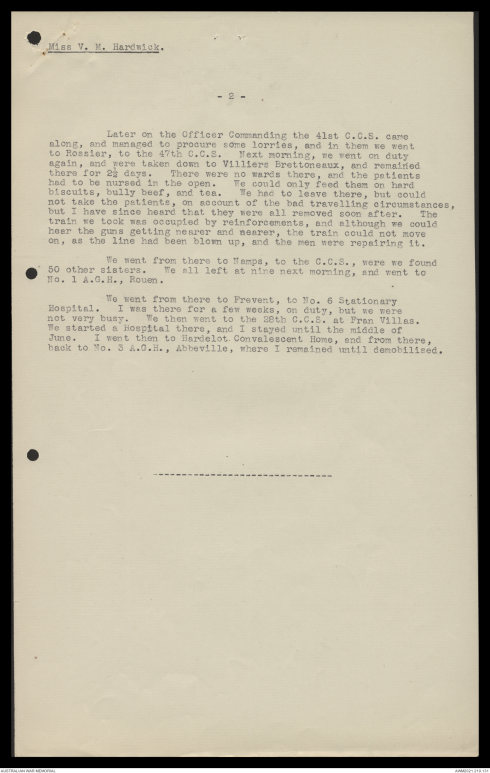
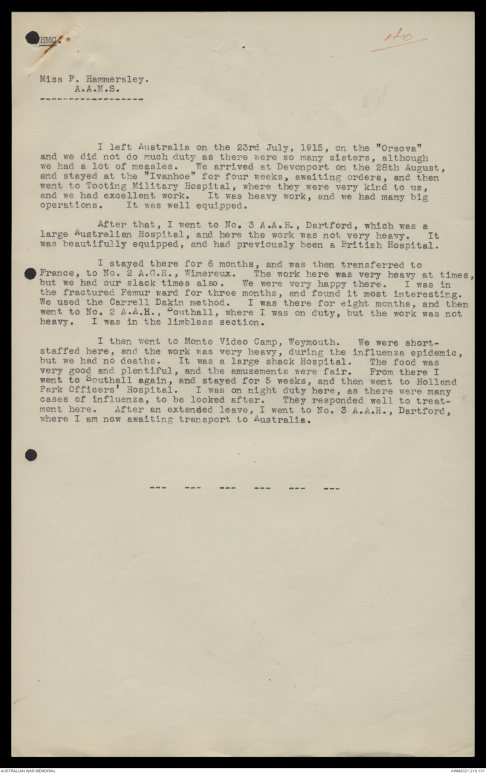
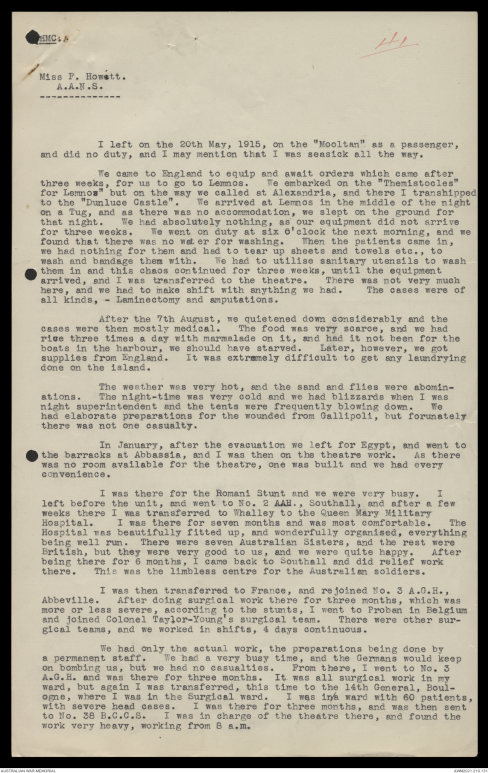
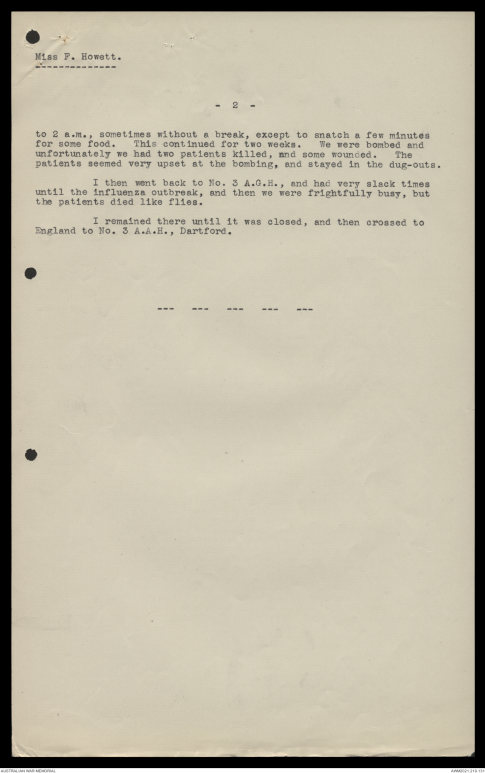
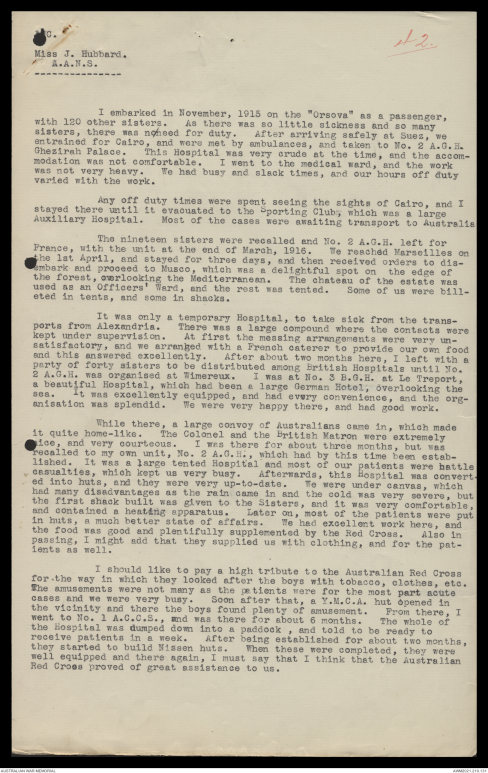
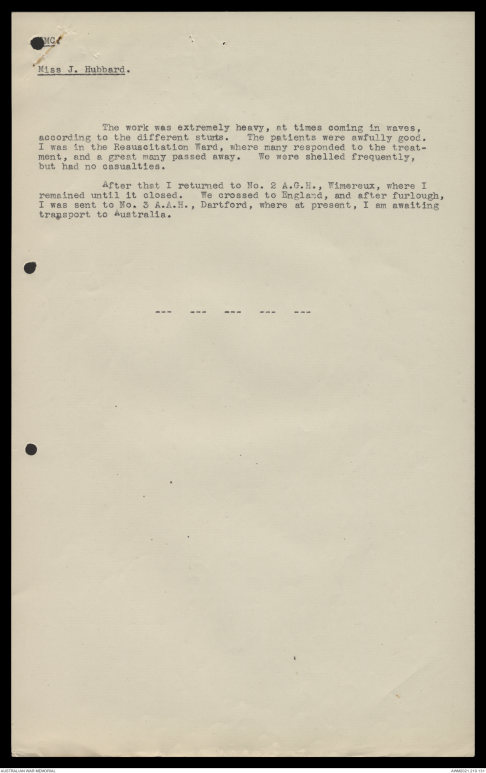
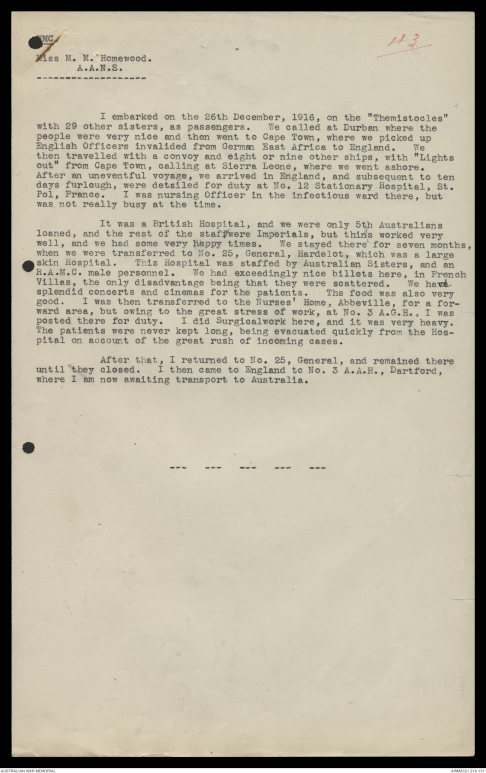
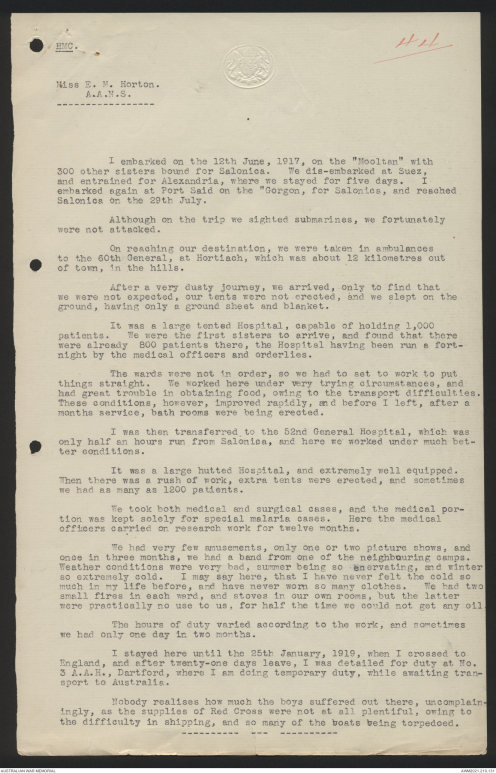
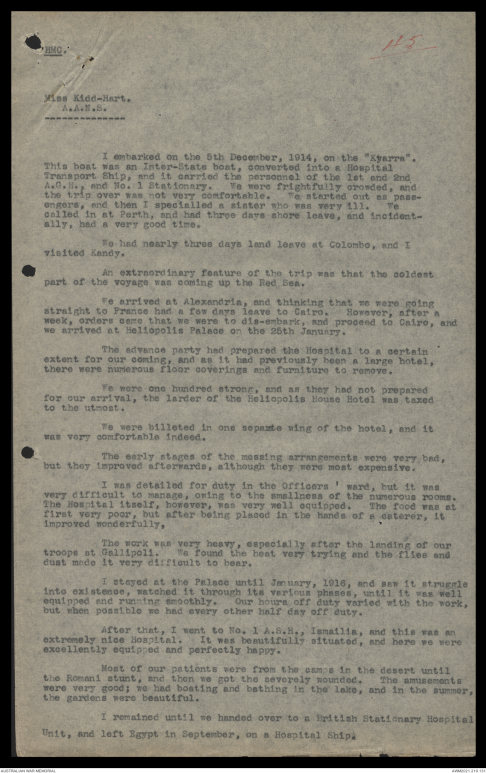
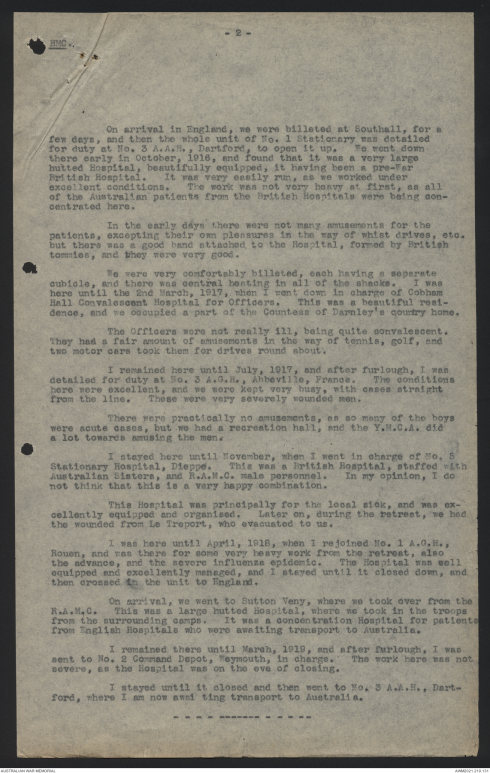
Miss V.M. Hardwick.
-2-
Later on the Officer Commanding the 41st C.C.S. came
along and managed to procure some lorries, and in them we went
to Rossier, to the 47th C.C.S. Next morning, we went on duty
again, and were taken down to Villiers Brettoneaux, and remained
there for 2½ days. There were no wards there, and the patients
had to be nursed in the open. We could only feed them on hard
biscuits, bully beef, and tea. We had to leave there, but could
not take the patients, on account of the bad travelling circumstances,
but I have since heard that they were all removed soon after. The
train we took was occupied by reinforcements, and although we could
hear the guns getting nearer and nearer, the train could not move
on, as the line had been blown up, and the men were repairing it.
We went from there to Namps, to the C.C.S., and we found
50 other sisters. We all left at nine next morning, and went to
No. 1 A.G.H., Rouen.
We went from there to Frevent, to No. 6 Stationary
Hospital. I was there for a few weeks, on duty, but we were
not very busy. We then went to the 28th C.C.S. at Fran Villas.
We started a Hospital there, and I stayed until the middle of
June. I went then to Hardelot Convalescent Home, and from there,
back to No. 3 A.G.H., Abbeville, where I remained until demobilised.
40
HMC.
Miss F Hammersley.
A.A.N.S.
I left Australia on the 23rd July, 1915, on the "Orsova"
and we did not do much duty as there were so many sisters, although
we had a lot of measles. We arrived at Devonport on the 28th August,
and stayed at the "Ivanhoe" for four weeks, awaiting orders, and then
went to Tooting Military Hospital, where they were very kind to us,
and we had excellent work. It was heavy work, and we had many big
operations. It was well equipped.
After that, I went to No. 3 A.A.H., Dartford, which was a
large Australian Hospital, and here the work was not very heavy. It
was beautifully equipped, and had previously been a British Hospital.
I stayed there for 6 months, and was then transferred to
France, to No. 2 A.G.H., Wimereux. The work here was very heavy at times,
but we had out slack times also. We were very happy there. I was in
the fractured Femur ward for three months, and found it most interesting.
We used the Carrell Dakin method. I was there for eight months, and then
went to No. 2 A.A.H., Southall, where I was on duty, but the work was not
heavy. I was in the limbless section.
I then went to Monte Video Camp Weymouth. We were short-staffed
here, and the word was very heavy, during the influenza epidemic,
but we had no deaths. It was a large shack Hospital. The food was
very good and plentiful, and the amusements were fair. From there I
went to Southall again, and stayed for 5 weeks, and then went to Holland
Park Officers' Hospital. I was on night duty here, as there were many
cases of influenza, to be looked after. They responded well to treatment
here. After an extended leave, I went to No. 3 A.A.H., Dartford
where I am now awaiting transport to Australia.
41
HMC.
Miss F. Howett.
A.A.N.S.
I left on the 20th May, 1915, on the "Mooltan" as a passenger,
and did no duty, and I may mention that I was seasick all the way.
We came to England to equip and await orders which came after
three weeks, for us to go to Lemnos. We embarked on the "Themistocles"
for Lemnos" but on the way we called at Alexandria, and there I transhipped
to the "Dunluce Castle". We arrived at Lemnos in the middle of the night
on a Tug, and as there was no accommodation, we slept on the ground for
that night. We had absolutely nothing, as our equipment did not arrive
for three weeks. We went on duty at six o'clock the next morning, and we
found that there was no water for washing. Then the patients came in,
we had nothing for them and had to tear up sheets and towels etc., to
wash and bandage them with. We had to utilise sanitary utensils to
wash them in and this chaos continued for three weeks, until the equipment
arrived, and I was transferred to the theatre. There was not very much
here, and we had to make shift with anything we had. The cases were of
all kinds, - Laminectomy and amputations.
After the 7th August, we quietened down considerable and the
cases were then mostly medical. The food was very scarce, and we had
rice three times a day with marmalade on it, and had it not been for the
boats in the harbour, we should have starved. Later, however, we got
supplies from England. It was extremely difficult to get any laundrying
done on the island.
The weather was very hot, and the sand and flies were abominations.
The night-time was very cold and we had blizzards when I was
night superintendent and the tents were frequently blowing down. We
had elaborate preparations for the wounded from Gallipoli, but fortunately
there was not one casualty.
In January, after the evacuation we left for Egypt, and went to
the barracks at Abbassia, and I was then on the theatre work, As there
was no room available for the theatre, one was built and we had every
convenience.
I was there for the Romani Stunt and we were very busy. I
left before the unit, and went to No. 2 AAH., Southall, and after a few
weeks there I was transferred to Whalley to the Queen Mary Military
Hospital. I was there for seven months and was most comfortable. The
Hospital was beautifully fitted up, and wonderfully organised, everything
being well run. There were seven Australian Sisters, and the rest were
British, but they were very good to us, and we were quite happy. After
being there for 6 months, I came back to Southall and did relief work
there. This was the limbless centre for the Australian soldiers.
I was then transferred to France, and rejoined No. 3 A.G.H.,
Abbeville. After doing surgical work there for three months, which was
more or less severe, according to the stunts, I went to Proban in Belgium
and joined Colonel Taylor-Young's surgical team. There were other surgical
teams, and we worked in shifts, 4 days continuous.
We had only the actual work, the preparations being done by
a permanent staff. We had a very busy time, and the Germans would keep
on bombing us, but we had no casualties. From there, I went to No. 3
A.G.H. and was there for three months. It was all surgical work in my
ward, and again I was transferred, this time to the 14th General, Boulogne,
where I was in the Surgical ward. I was in a ward with 60 patients,
with severe head cases. I was there for three months, and was then sent
to No. 38 B.C.C.S. I was in charge of the theatre there, and found the
work very heavy, working from 8 a.m.
Miss F. Howett
- 2 -
to 2 a.m., sometimes without a break, except to snatch a few minutes
for some food. This continued for two weeks. We were bombed and
unfortunately we had two patients killed, and some wounded. The
patients seemed very quiet at the bombing, and stayed in the dug-outs.
I then went back to No. 3 A.G.H., and had a very slack times
until the influenza outbreak, and then we were frightfully busy, but
the patients died like flies.
I remained there until it was closed, and then crossed to
England to No. 3 A.A.H., Dartford
42.
HMC.
Miss J. Hubbard.
A.A.N.S.
I embarked in November, 1915 on the "Orsova" as a passenger,
with 120 other sisters. As there was so little sickness and so many
sisters, there was no need for duty. After arriving safely in Suez, we
entrained for Cairo, and were met by ambulances, and taken to No. 2 A.G.H.
Ghezirah Palace. This Hospital was very crude at the time, and the accommodation
was not comfortable. I went to the medical ward, and the work
was not very heavy. We had busy and slack times, and our hours off duty
varied with the work.
Any off duty times were spent seeing the sights of Cairo and I
stayed there until it evacuated to the Sporting Club, which was a large
Auxiliary Hospital. Most of the cases were awaiting transport to Australia.
The nineteen sisters were recalled and No. 2 A.G.H. left for
France, with the unit at the end of March, 1916. We reached Marseilles on
the 1st April, and stayed for three days, and then received orders to disembark
and proceed to Musco, which was a delightful spot on the edge of
the forest, overlooking the Mediterranean. The chateau of the estate was
used as the Officers' Ward, and the rest was tented. Some of us were billeted
in tents, and some in shacks.
It was only a temporary hospital, to take sick from the transports
from Alexandria. There was a large compound where the contacts were
kept under supervision. At first the messing arrangements were very
unsatisfactory, and we arrange with a French caterer to provide our own food
and this answered excellently. After about two months here, I left with a
party of forty sisters to be distributed among British Hospitals until No.
2 A.G.H. was organised at Wimereux. I was at No. 3 B.G.H. at Le Treport,
a beautiful Hospital, which had been a large German Hotel, overlooking the
sea. It was excellently equipped, and had every convenience, and the organisation
was splendid. We were very happy there, and had good work.
While there, a large convoy of Australians came in, which made
it quite home-like. The Colonel and the British Matron were extremely
nice and very courteous. I was there for about three months, but was
recalled to my own unit, No. 2 A.G.H., which had by this time been established.
It was a large tented Hospital and most of our patients were battle
casualties, which kept us very busy. Afterwards, this Hospital was converted
into huts, and they were very up-to-date. We were under canvas, which
had many disadvantages as the rain came in and the cold was very severe, but
the first shack built was given to the Sisters, and it was very comfortable,
and contained a heating apparatus. Later on, most of the patients were put
in huts, a much better state of affairs. We had excellent work here, and
the food was good and plentifully supplemented by the Red Cross. Also in
passing, I might add that they supplied us with clothing, and for the patients
as well.
I should like to pay a high tribute to the Australian Red Cross
for the way in which they looked after the boys with tobacco, clothes, etc.
The amusements were not many as the patients were for the most part acute
cases and we were very busy. Soon after that, a Y.M.C.A. hut opened in
the vicinity and there the boys found plenty of amusement. From there, I
went to No. 1 A.C.C.S., and was there for about 6 months. The whole of
Hospital was dumped down into a paddock, and told to be ready to
receive patients in a week. After being established for about two months,
they started to build Nissen huts. When these were completed, they were
well equipped and there again, I must say I think that the Australian
Red Cross proved of great assistance to us.
HMC.
Miss J. Hubbard.
The work was extremely heavy, at times coming in waves,
according to the different stunts. The patients were awfully good,.
I was in the Resuscitation Ward, where many responded to the treatment,
and a great many passed away. We were shelled frequently,
but had no casualties.
After that I returned to No. 2 A.G.H., Wimereux, where I
remained until it closed. We crossed to England, and after furlough,
I was sent to No. 3 A.A.H., Dartford, where at present, I am awaiting
transport to Australia.
43
HMC.
Miss M.M. Homewood
A.A.N.S.
I embarked on the 26th December, 1916, on the "Themistocles"
with 29 other sisters, as passengers. We called at Durban where the
people were very nice and then went to Cape Town, where we picked up
English Officers invalided from German East Africa to England. We
then travelled with a convoy and eight or nine other ships, with "Lights
out" from Cape Town, calling at Sierra Leone, where we went ashore.
After an uneventful voyage, we arrived in England, and subsequent to ten
days furlough, were detailed for duty at No. 12 Stationary Hospital, St.
Pol, France. I was nursing Officer in the infectious ward there, but
was not really busy at the time.
It was a British Hospital, and we were only 5th Australians
loaned, and the rest of the staff were Imperials, but thins worked very
well, and we had some very happy times. We stayed there for seven months
when we were transferred to No. 25, Genera, Hardelot, which was a large
skin Hospital. This Hospital was staffed by Australian Sisters, and an
R.A.M.C. male personnel. We had exceedingly nice billets here, in French
Villas, the only disadvantage being that they were scattered. We had
splendid concerts and cinemas for the patients. The food was also very
good. I was then transferred to the Nurses' Home, Abbeville, for a forward
area, but owing to the great stress of work, at No. 3 A.G.H., I was
posted there for duty. I did Surgical work here, and it was very heavy.
The patients were never kept long, being evacuated quickly from the Hospital
on account of the great rush of incoming cases.
After that, I returned to No. 25, General, and remained there
until they closed. I then came to England to No. 3 A.A., Dartford,
where I am now awaiting transport to Australia.
44
HMC.
Miss E. M. Horton.
A.A.N.S.
I embarked on the 12th June, 1917, on the "Mooltan" with
300 other sisters bound for Salonica. We dis-embarked at Suez,
and entrained for Alexandria, where we stayed for five days. I
embarked again at Port Said on the "Gorgon, for Salonica, and reached
Salonica on the 29th July.
Although on the trip we sighted submarines, we fortunately
were not attacked.
On reaching our destination, we were taken in ambulances
to the 60th General, at Hortiach, which was about 12 kilometres out
of town, in the hills.
After a very dusty journey, we arrived, only to find that
we were not expected, our tents were not erected, and we slept on the
ground, having only a ground sheet and blanket.
It was a large tented Hospital, capable of holding 1,000
patients. We were the first sisters to arrive, and found that there
were already 800 patients there, the Hospital having been run a fortnight
by the medical officers and orderlies.
The wards were not in order, so we had to set to work to put
things straight. We worked here under very trying circumstances, and
had great trouble in obtaining food, owing to the transport difficulties.
These conditions, however, improved rapidly, and before I left, after a
months service, bath rooms were being erected.
I was then transferred to the 52nd General Hospital, which was
only half an hours run from Salonica, and here we worked under much better
conditions.
It was a large hutted Hospital, and extremely well equipped.
Then there was a rush of work, extra tents were erected, and sometimes
we had as many as 1200 patients.
We took both medical and surgical cases, and the medical portion
was kept solely for special malaria cases. Here the medical
officers carried on research work for twelve months,
We had very few amusements, only one or two picture shows, and
once in three months, we had a band from one of the neighbouring camps.
Weather conditions were very bad, summer being so enervating, and winter
so extremely cold. I may say here, that I have never felt the cold so
much in my life before, and have never worn so many clothes. We had two
small fires in each ward, and stoves in our own rooms, but the latter
were practically no use to us, for half the time we could not get any oil.
The hours of duty varied according to the work, and sometimes
we had only day off in two months.
I stayed here until the 25th January, 1919, when I crossed to
England, and after twenty-one days leave, I was detailed for duty at No.
3 A.A.H., Dartford, where I am doing temporary duty, which awaiting transport
to Australia.
Nobody realises how much the boys suffered out there, uncomplainingly,
as the supplies of Red Cross were not at all plentiful, owing to
the difficulty in shipping, and so many of the boats being torpedoed.
45
HMC.
I embarked on the 5th December, 1914, on the "Kyarra".
This boat was an Inter-State boat, converted into a Hospital
Transport Ship, and it carried the personnel of the 1st and 2nd
A.G.H., and No. 1 Stationary. We were frightfully crowded, and
the trip over was not very comfortable. We started out as passengers,
and then I specialled a sister who was very ill. We
called in at Perth, and had three days shore leave, and incidentally,
had a very good time.
We had nearly three days land leave at Colombo, and I
visited Kandy.
An extraordinary feature of the trip was that the coldest
part of the voyage was coming up the Red Sea.
We arrived in Alexandria, and thinking that we were going
straight to France had a few days leave in Cairo. However, after a
week, orders came that we were to dis-embark, and proceed to Cairo, and
we arrived at Heliopolis Palace on the 25th January.
The advance party had prepared the Hospital to a certain
extent for our coming, and as it had previously been a large hotel,
there were numerous floor coverings and furniture to remove.
We were one hundred strong, and as they had not prepared
for our arrival, the larder of the Heliopolis House Hotel was taxed
to the utmost.
We were billeted in one separate wing of the hotel, and it
was very comfortable indeed.
The early stages of the messing arrangements were very bad,
but they improved afterwards, although they were most expensive.
I was detailed for duty in the Officers' ward, but it was
very difficult to manage, owing to the smallness of the numerous rooms.
The Hospital itself, however was very well equipped. The food was at
first very poor, but after being placed in the hands of a caterer, it
improved wonderfully.
The work was very heavy, especially after the landing of our
troops at Gallipoli. We found the heat very trying and the flies and
dust made it very difficult to bear.
I stayed at the Palace until January, 1916, and saw it struggle
into existence, watched it thought its various phases, until it was well
equipped and running smoothly. Our hours off duty varied with the work,
but when possible we had every other half day off duty.
After that, I went to No. 1 A.S.H., Ismailia, and this was an
extremely nice Hospital. It was beautifully situated, and here we were
excellently equipped and perfectly happy.
Most of our patients were from the camps in the desert until
the Romani stunt, and then we got the severely wounded. The amusements
were very good; we had boating and bathing in the lake, and in the summer
the gardens were beautiful.
I remained until we handed over to a British Stationary Hospital
Unit, and left Egypt in September, on a Hospital Ship.
-2-
On arrival in England, we were billeted at Southall, for a
few days, and then the whole unit of No. 1 Stationary was detailed
for duty at No. 3 A.A.H., Dartford, to open it up. We went down
there early in October, 1916, and found that it was a very large
hutted Hospital, beautifully equipped, it having been a pre-War
British Hospital. It was very easily run, as we worked under
excellent conditions. The work was not very heavy at first, as all
of the Australian patients from the British Hospitals were being
concentrated here.
In the early days there were not many amusements for the
patients, excepting their own pleasures in the way of whist drives, etc.
but there was a good band attached to the Hospital, formed by British
tommies, and they were very good.
We were very comfortably billeted, each having a separate
cubicle, and there was central heating in all of the shacks. I was
here until the 2nd March 1917, when I went down in charge of Cobham
Hall Convalescent Hospital for Officers. This was a beautiful residence,
and we occupied a part of the Countess of Darnley's country home,
The Officers were not really ill, being quite convalescent.
They had a fair amount of amusements in the way of tennis, golf, and
two motor cars took them for drives round about.
I remained here until July, 1917, and after furlough, I was
detailed for duty at No. 3 A.G.H., Abbeville, France. The conditions
here were excellent, and we were kept very busy, with cases straight
from the line. These were very severely injured men.
There were practically no amusements, as so many of the boys
were acute cases, but we had a recreation hall, and the Y.M.C.A. did
a lot towards amusing the men.
I stayed here until November, when I went in charge of No. 5
Stationary Hospital, Dieppe. This was a British Hospital, staffed with
Australian Sisters, and R.A.N.C. male personnel. In my opinion, I do
not think that this was a very happy combination.
This hospital was principally for the local sick, and was excellently
equipped and organised. Later on, during the retreat, we had
the wounded from Le Treport, who evacuated to us.
I was there until April, 1918, when I rejoined No. 1 A.G.H.,
Rouen, and was there for some very heavy work from the retreat, also
the advances, and the severe influenza epidemic. The Hospital was well
equipped and excellently managed, and I stayed until it closed down, and
then crossed to the unit in England.
On arrival, we went to Sutton Veny, where we took over from the
R.A.M.C. This was a large hutted Hospital, where we took in the troops
from the surrounding camps. It was a concentration Hospital for patients
from English Hospitals who were awaiting transport to Australia.
I remained there until March, 1919, and after furlough, I was
sent to No. 2 Command Depot, Weymouth, in charge. The work here was not
severe, as the Hospital was on the eve of closing.
I stayed until it closed and then went to No. 3 A.G.H., Dartford,
where I am now awaiting transport to Australia.
 Sam scott
Sam scottThis transcription item is now locked to you for editing. To release the lock either Save your changes or Cancel.
This lock will be automatically released after 60 minutes of inactivity.